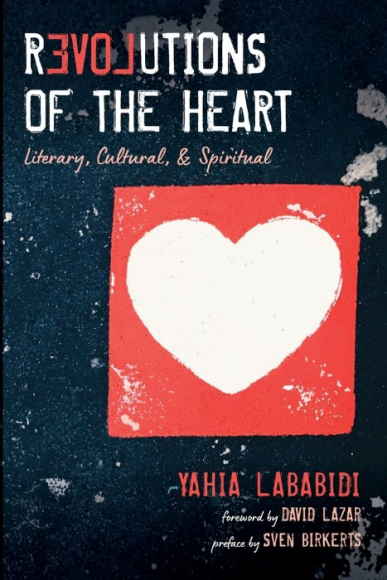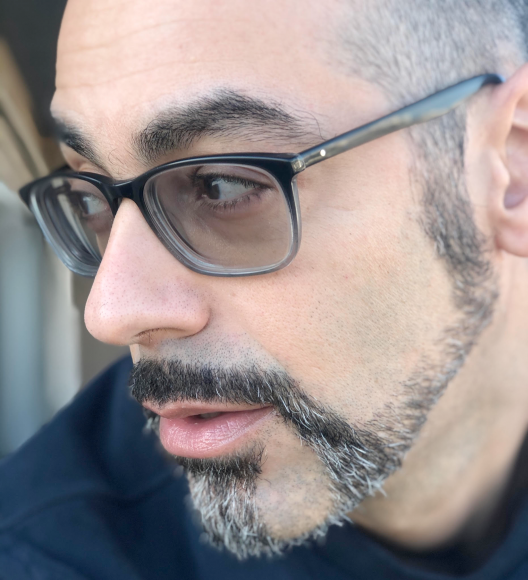Revolutions of the Heart: Literary, Cultural, & Spiritual
By Yahia Lababidi (Wipf & Stock, 2020)
Egyptian-American Yahia Lababidi is the author of seven books: Signposts to Elsewhere, a compilation of aphorisms selected as Book of the Year (2008) by The Independent (UK), Where Epics Fail, Balancing Acts: New & Selected Poems (1993-2015), Trial by Ink: From Nietzsche to Belly Dancing, Fever Dreams, and Barely There. In addition to these, he co-authored with Alex Stein The Artist as Mystic: Conversations with Yahia Lababidi and has been nominated three times for a Pushcart Prize. His writing has been translated into numerous languages including Arabic, Hebrew, Slovak, Spanish, French, Italian, German, Dutch and Swedish. Lababidi was chosen as a juror for the 2012 Neustadt International Prize for Literature – a biennial award widely considered to be the most prestigious international literary prize after the Nobel Prize in Literature. For a more detailed summary of his writing career, see Poets&Writers.
Yahia Lababidi’s new book, Revolutions of the Heart, is a moving collage of essays, conversations, aphorisms, poems, interviews and reflections, bearing witness to an impressive lifelong study and practice of philosophy, literature and creativity. The book reaches out to the reader, builds “eye contact: how souls catch fire,” brings hope during periods of desperation, inspires writers in their art, speaks eloquently from the heart, and stays long after it is read and placed back on the bookshelf.
As I pondered over my electronic copy of Revolutions, I wondered how much better it would have been with a hard copy of the book in hand, allowing me to feel and mark the words on pages turned. My screen felt distant, very much like everything else during these pandemic days. Yet in going through the book, I found myself experiencing and enjoying the ambiguity in the nearness of this very “distance,” and sharing some of the longing for transformation to which Lababidi has dedicated his book.
Revolutions starts with the author’s journey as a writer, thinker and poet, “living through” Rilke, Nietzsche, Kierkegaard, Rimbaud, Baudelaire, Wilde, Dostoevsky – philosophers and writers who first shaped his thought and who continue to accompany him – before turning to Eastern mysticism and transcendence in the teachings of the Tao te Ching, Rumi, Al-Ghazali, Mahmoud Darwish, Khaled Mattawa, Ibn Ata Illah, Kahlil Gibran, and many others.
To me as a reader and reviewer, it seems as though that journey is always beginning, with creative biographers sounding their own truths while “donning masks [of their] great dead friends,” and poets becoming the poem – “one agonizing line, or liberating verse, at a time.” [“Every Subject Chooses Its Author”]
The essay “Poetry and Journalism of the Future” resonates with first-generation immigrants who, like Lababidi, feel helpless and frustrated seeing their “world unraveling continents and oceans away.” His powerful words connect the reader with this desperation while also “cultivating a certain distance” and a depth of vision that “provides more insight than mere sight.” Poetry, thus, “at its finest,” restores our sight, speaks our silences and makes sense of our pain.
In “Radical Love: Mysticism in Islam,” Lababidi describes the “painful reality” of Islamophobia. “It’s tiresome to be continually on the defensive,” he writes, underscoring the irony that even during “this historical moment of Islamophobic panic,” the 13th-century Sufi mystic, Rumi, “is not only a best-selling poet but the most popular poet in the US!” In the West, however, the appreciation of Rumi’s art comes at “the expense of erasure of Islam from his work – as though this beloved, mystical poet is only palatable to the masses if entirely dissociated from the seeming stain of Islam.”
One cannot write of Lababidi without mentioning his aphorisms – “wisdom literature,” a “soul’s dialogue with itself” – born of his “obsessive reading” that taught him how to write. This all changed on his return to Egypt, when he says he lost his silences… and lost his voice. Aphorisms lay beyond reach. It was not until ten years later that, “spurred by the terse wisdom of the Tao te Ching and Sufi teachers,” he returned to “these brief arts.” [“Reverence for the Visible and Invisible Worlds”]
Lababidi speaks poignantly of the 2011 people’s uprising in Egypt – the Arab Spring. “Over time,” he writes, “I’ve come to regard my beloved Cairo as a joyous child whose confidence has, profoundly, been shaken by repeated scolding and attempts at molding. We’re not quite ourselves at the moment, I tell myself, and are battling for our souls.”
He continues:
Our unfortunate present moment does not define us; we’re better than this unbecoming fear and loathing. The lengthening shadow that we are witnessing—in the Middle East, in Europe, in the Divided States of America—is just a hiccup in time, viewed in the context of humanity’s long illustrious history. When my spirits sag, I am buoyed up by the noble Arabic slogan that circulated following our Egyptian Revolution: ‘Despair is betrayal, and Hope a responsibility.’ [“Reborn in the USA: An Immigrant & Poet’s Story (who also happens to be Muslim)”]
He fondly brings to mind his recollections of Yusuf Idris, Louis Awad, Ahmed Ragab, Farouk Goudah, Abdul Rahman Al Abnoudi, Alaa-Al-Aswany, Yusuf Rakha, Son’allah Ibrahim, Nawal El Saadawi, Ahdaf Soueif and Radwa Ashour.
As an editor, I read with some trepidation the chapter “Can an Editor Get Too Creative: A Writer’s Quandary.” Editing always involves walking a fine line, and as Lababidi points out, taking on “a tough (sometimes, thankless) task.” I was personally amused to read the account of an “intrepid editor” who had taken some of Lababidi’s “stand-alone aphorisms” and “woven them into a ‘poem’!” So changed was this version that the author could no longer recognize it as his own, even though the words were his. Writing is no doubt “an intimate matter and rearranging the words of another is akin to shuffling their thoughts and emotions.”
There is a memorable chapter on Frankenstein that made me rethink some of the critical pieces I had written in university. “It is very telling, and a scathing commentary on the superficiality of society,” writes Lababidi, “that the only civilized audience the creature is granted is with one who does not have the prejudice of vision to discriminate, nor the brutality of youth to intimidate: Delacey, an old blind man.” His incisive critique left me pondering, unsettled. Even today, we are continuing to create our “monsters,” our fears, born of culture and the “vision” of our prejudices. [“Frankenstein: Society-Spawned Humane Monsters and Monstrous Humans”]
I began this review by mentioning Lababidi’s dedication to transformation. Revolutions is an important book. In our divided world today, it seeks our transformation as people first, then as citizens of one planet earth, envisioned beyond the divisions of political boundaries… with elements that, like pandemics, do not differentiate one from another. We are “in the deep end, [where] every stroke counts.” We will either swim or sink. Together. And we will find ourselves not in words, but in our wounds, our silences.
I end with two brief lines that Lababidi says first drew him into writing: “Heidegger’s definition of Longing: ‘the agony of the nearness of the distant’ as well as Rumi’s ‘What you are seeking is also seeking you.’” [“The Aphorist in Conversation with Sholeh Johnston”]










